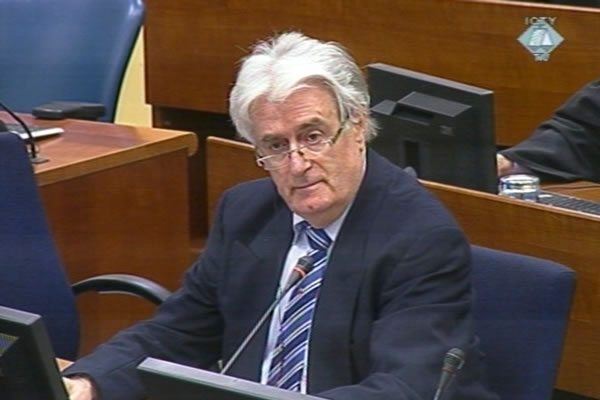Home
‘THINGS THAT SHOULDN’T HAVE HAPPENED’ IN OMARSKA
In 1992, Karadzic’s protected defense witness worked in Omarska. In the three months of his tenure there, the witness was in the camp on a daily basis and during that time, he claimed, he learned of ‘only one incident’ when a prisoner was abused, and of the death of 18 inmates. Karadzic’s witness shifted the blame on the late chief of the Prijedor police, Simo Drljaca, adding that there were ‘not enough’ guards and inspectors
 Radovan Karadzic in the courtroom
Radovan Karadzic in the courtroom A former police officer gave evidence in Radovan Karadzic’s defense with identity protection measured, under the pseudonym KW 609. The witness worked in the Omarska prison camp in Prijedor but his actual job was not disclosed. KW 609 worked in the prison camp for three months, until early August 1992. Most of the non-Serb detainees had been already transferred to the Manjaca prison camp by that time. The transcript of the witness’s evidence at the trial of Mico Stanisic and Stojan Zupljanin was admitted into evidence. At that time, Stanisic and Zupljanin were the highest ranking Bosnian Serb police officials. The accused briefly presented the summary of the witness’s evidence in court.
The witness claimed that Zeljko Mejakic was the commander of the ‘investigation and operations center’ of Omarska. Mejakic’s deputy was Miroslav Kvocka before he was dismissed following an attempt to save his wife’s three brothers. Mladjo Radic was the commander of the guard service. KW 609 claimed that about 3,000 persons were interviewed in the center. Based on the interrogations, the prisoners were divided into three categories. The first category included those who had purportedly taken part in the fight against the newly established Serb authorities in Prijedor. The second category included those who aided them, and the third category comprised those who were in the clear. In early August 1992, the prisoners from the first two categories were transferred to Manjaca. The people in the third category were taken to Trnopolje. In that period, the Omarska prison camp was tidied up on Ratko Mladic’s orders, the witness recounted. Additional beds were brought in to beautify the site for a visit of the International Red Cross.
The witness claimed that during the three months he was in Omarska, which is more or less throughout the time the camp was in operation, he learned of ‘only one incident’ in which a prisoner was abused. In July 1992, KW 609 claimed, he learned that 18 persons who were on a list put together by Dusko Knezevic were killed. The witness said that he reported the incident to the chief of the Prijedor police, Simo Drljaca.
Prosecutor Sutherland confronted the witness in the cross-examination with the evidence presented during the trial so far: other witnesses have claimed that bodies could be seen inside the prison camp perimeter almost every day. She asked the witness how it was possible that he didn’t notice any of it during the three months he was there. ‘Well now, I can’t remember exactly’, the witness said, after giving it some thought.
The witness also agreed with the suggestion that the police didn’t have the right to detain people for more than three days without charging them. As it was wartime, laws were not observed very strictly, the witness explained. As he explained, he was a vocal advocate of the release of the prisoners, especially those from the third category, because even the investigators were sure that they hadn’t done anything wrong. Simo Drljaca nevertheless ordered specifically that no one should leave Omarska without his knowledge. Drljaca was killed in July 1997 as he resisted arrest. It is convenient for Drljaca’s former associates and for the defense teams of the accused in The Hague to use Drljaca as a scapegoat for the Prijedor crimes. In the re-examination, the witness said that the ‘things that shouldn’t have happened did happen’ in Omarska. In addition to Drljaca, ‘a small number of guards and inspectors’ were responsible for the crimes.
Radovan Karadzic’s trial continued with the testimony of Dusko Jaksic, director of the Institute of Economics in Banja Luka.
Linked Reports
- Case : Karadzic
- 2014-01-28 TROOPS WATCHED RELIGIOUS BUILDINGS BEING BLOWN UP
- 2014-01-28 MLADIC DESERTS KARADZIC’S FRONT LINE
- 2014-01-27 KARADZIC’S WITNESS: FOREIGN SERVICES BEHIND THE KORICANSKE STIJENE MASSACRE
- 2014-01-30 WITNESS DOESN’T KNOW WHO KILLED VILLAGERS, BUT KNOWS THEY ‘RAN AMOK’
- 2014-01-30 INCIDENT IN HAMBARINE – CAUSE OR PRETEXT FOR CRIMES?
- 2014-02-03 IF BOSNIAN SERB POLICE HAD BEEN PART OF INTERPOL…
